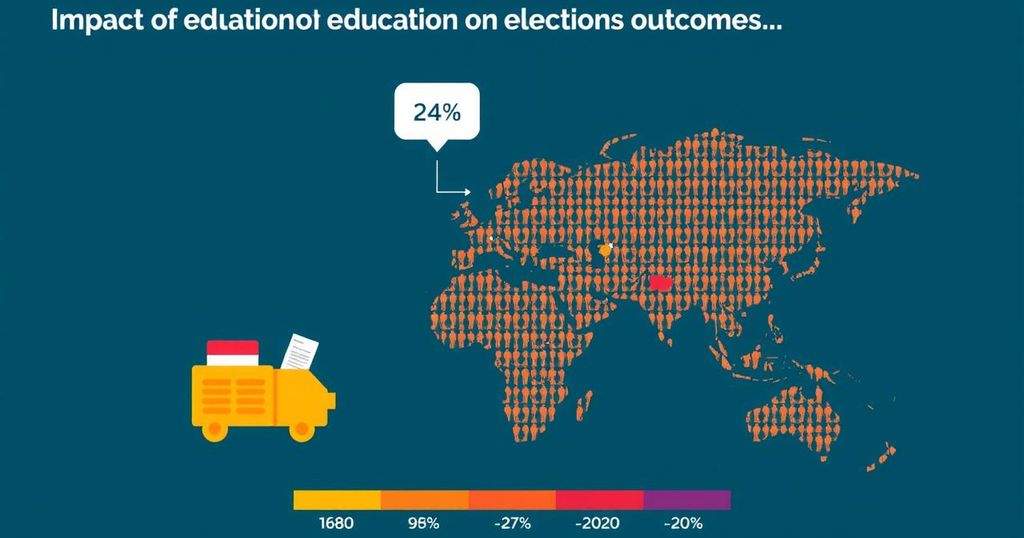Politics
AMERICA, BRASS JAR PRODUCTIONS, BRAZIL, CHICAGO, COLORADO, COMEDY, COMMUNITY VENTURES, DC, ECONOMIC MOBILITY, ELECTION, GARY, GARY COMMUNITY VENTURES, HOUSTON, INTERVIEW, MEDIA, MEDIA COVERAGE, NORTH AMERICA, NY, PHOENIX, SLATE, SOUTH AMERICA, TRANSYLVANIA, UNITED STATES
Fatima Khan
0 Comments
The Interplay of Education and Electoral Preferences Amid Economic Uncertainty
The article discusses the divergence between stated and revealed preferences in education and how it impacts electoral decisions, especially in light of economic insecurities. It examines the phenomenon from various angles, including the unique case of Drunk Shakespeare, and highlights how preferences in educational pathways reflect broader societal concerns, foreshadowing potential shifts in voter behavior in the upcoming election.
The intriguing intersection of education and electoral outcomes is underscored by recent sociocultural phenomena, such as the inaugural union contract established by Brass Jar Productions for their theatrical endeavor, Drunk Shakespeare. This unique production allows a professional actor to consume five shots of whiskey while attempting to perform Shakespeare, with sober co-stars striving to maintain the show’s integrity. This development has sparked conversations regarding public preferences toward unconventional forms of entertainment, a reflection of broader societal patterns where revealed preferences often diverge from stated preferences. At a recent summit aimed at enhancing economic mobility in Colorado, the discourse centered on the ongoing disconnect between espoused desires for apprenticeships and the reality of their limited adoption. Julie Stone of Gary Community Ventures articulated this disparity poignantly, questioning, “Can you name any system-level solution more widely endorsed, but so narrowly adopted?” This concept resonates in the sphere of K-12 education, wherein families consistently express satisfaction with public schools, yet a significant number have opted for alternatives such as charter schools, with 3.7 million students currently enrolled across this alternative educational framework. This trend continues with the rise of Education Savings Accounts (ESAs), which allow families increased flexibility in selecting educational paths for their children. Compounded by economic uncertainties and rapid shifts in job integrity, parents’ apprehensions regarding their children’s futures have driven a migration toward urban universities and pre-professional degrees, reflective of a broader societal inclination toward perceived stable career pathways. Despite widespread support for initiatives like public funding for community colleges, actual enrollment figures tell another story, with participating rates indicating a stark decline in prospective students opting for these educational institutions. As we approach the eminently consequential 2024 presidential election, the theme of revealed versus stated preferences comes into sharp focus. The electorate’s current indecision, notably reflected in polling data, leads to a Spectrum of choices where economic insecurity serves as a significant pivot point for voters’ decisions. This election stands to illustrate whether educational backgrounds genuinely forecast electoral outcomes or if the electorate’s shifting priorities indicate a demand for more pragmatic leadership amidst unfamiliar uncertainties.
To contextualize the discussion regarding the effects of education on electoral behavior, one must consider the societal backdrop in which these phenomena are occurring. American cultural narratives surrounding education and work have evolved, particularly in response to the global digital transformation, economic shifts, and declining enrollment across various educational institutions. The societal expectation that children will experience improved economic prospects compared to their parents has become increasingly precarious for many families, prompting reassessments of both education and political choices as reflection of deeper economic anxieties.
As the electorate prepares to engage in the decision-making process for the upcoming presidential election, the stark contrast between stated and revealed preferences in education may serve as a harbinger for voter behavior. If economic and educational conditions lead individuals to seek safer choices, potential shifts in electoral support toward candidates who represent familiarity, despite inherent risks, will define new paradigms of American political life. The connection between voter cognition and education outcomes remains a critical area of exploration that warrants continued scrutiny as societal conditions evolve.
Original Source: www.forbes.com




Post Comment